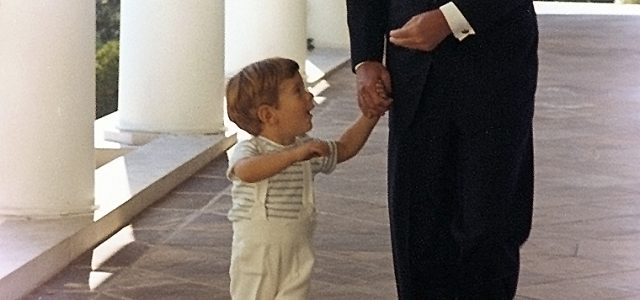
ST-C333-3-63 10 October 1963 President Kennedy and his son, John F. Kennedy Jr. White House, West Wing Colonnade. Photograph by Cecil Stoughton, White House, in the John F. Kennedy Presidential Library and Museum, Boston.
President Kennedy died three years before I was born, but I grew up in the large shadow of his life. I was keenly aware of the millions of people who admired him and felt that we had lost a magical leader and period in our country that we would never recapture. As we remember the tragic events of November 22, 1963 and the assassination of John F. Kennedy, many people are asking a number of questions about his death; how would history have been different if he hadn’t been killed? Did Oswald act alone or was Kennedy’s death part of a larger conspiracy? What if Kennedy had more security on his limousine ride through Dallas? This question brings me to the connection to fair warning and the possibility that human nature may have prevented JFK from listening to credible warnings, particularly since he was in a position of power as the President of the United States and leader of the free world.
Kennedy was warned repeatedly not to go to Dallas in November of 1963 and not to ride in an open convertible limousine, as Dallas was considered a hostile environment from which multiple threats had been identified. In the book “In the President’s Secret Service” by Ronald Kessler, Kessler writes: “If Kennedy was reckless in his personal life, he was also rash when it came to security. Before his trip to Dallas on November 22, 1963, he received warnings about possible violence there. UN Ambassador Adlai Stevenson called Kennedy aide Arthur Schlesinger, Jr., and urged him to tell the president not to go to Dallas. Stevenson said he had just given a speech in Dallas and had been confronted by demonstrators who’d cursed at him and spat on him. Stevenson said Senator J. William Fulbright also warned Kennedy. “Dallas is a very dangerous place, “ Fulbright told him. “I wouldn’t go there. Don’t you go“.
Nonetheless, Kennedy aide Lawrence O’Donnell told the Secret Service that unless it was raining, the president wanted to ride in an open convertible, according to the Warren Commission Report, which was largely based on the FBI’s investigation. If it had rained, Kennedy would have used a plastic top that was not bulletproof, but the presence of the top may have made the president a harder target to aim at. Kennedy himself told agents he did not want them to ride on the small running boards at the rear of the car. Multiple credible sources and warnings were ignored, and tragically the President was assassinated.
As for JFK, Jr., although not a President or a holder of political office, he certainly had a high level of power and influence as the son of a United States President, an editor of a prominent magazine, and as a potential aspiring candidate for public office. But as a relatively inexperienced small-airplane pilot in July of 1999, he received multiple warnings about flying his plane at night to the island of Nantucket. The most direct warnings came from his own flight instructor, who not only warned of the fog that rolled over Nantucket in the evening, but who also offered to fly Kennedy, his wife and sister-in-law to Nantucket. The warning was ignored, the flight instructor’s offer refused…and three lives lost.
Larry J. Sabato, author of The Kennedy Half-Century: The Presidency, Assassination, and Lasting Legacy of John F. Kennedy, in his November 18, 2013 column in Talking Points Memo (TPM) Book Club, wrote that President Kennedy certainly understood his frightening degree of exposure, and thought a good bit about the possibility of assassination. Sabato continued by saying that although Kennedy was fatalistic about it, he also had a false sense of invulnerability, perhaps relying on history’s odds.
Why would Kennedy have this sense of invulnerability, the same false sense that may have been shared by his son John Jr.? People in higher positions have a tendency to dismiss information provided to them by individuals who are perceived as lower on the “totem pole”, regardless of the fact that these individuals can be very credible sources who are closer to the information at hand and the disaster waiting to occur. The social psychologist Adam Galinsky from Northwestern University describes the dynamics of power and how it can corrupt sound decision-making. Power has a tendency to make certain individuals feel invincible; as though they are immune from a disaster. Power may make an individual falsely believe that the warnings don’t apply to them. In fact, at one time or another, all of us may have a false sense of invulnerability, particularly when we’re younger.
We’re left to ponder many questions on the 50th anniversary of JFK’s death, including:
• What if the president had listened to the warnings and skipped the trip to Dallas, or at least accepted more security on his parade route?
• Did the President’s son John Jr. inherit the same false sense of invulnerability that may have led to his death over 30 years after his father was killed?
• Is it human nature for all of us to be pre-disposed to ignore warnings, particularly for individuals in positions of power who have a false sense of invulnerability?
We may never have the perfect answers to these questions, but they’re worth asking and discussing, as merely considering these questions may help to avoid tragedy and save a life in the future.

No comments yet.
No one have left a comment for this post yet!